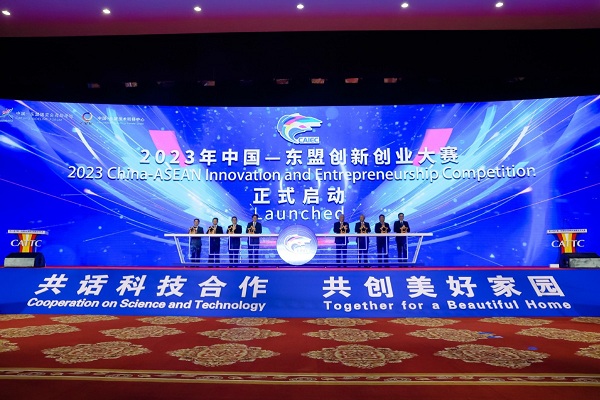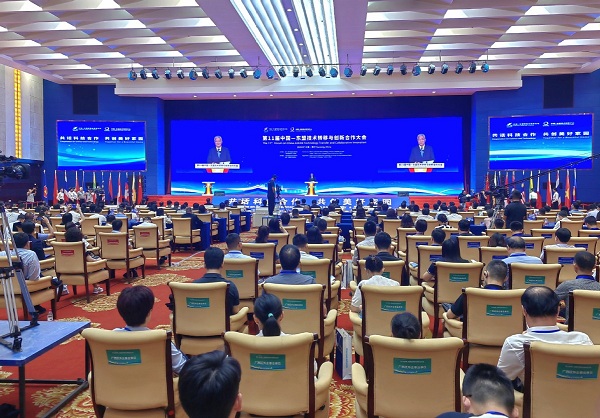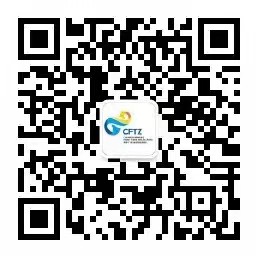
Sino-ASEAN exchanges stressed in sci-tech innovation and sharing

The 11th Forum on China-ASEAN Technology Transfer and Collaborative Innovation saw the launch of the 2023 China-ASEAN Innovation and Entrepreneurship Competition on July 13. PROVIDED TO CHINA DAILY
A more robust mechanism is needed to facilitate the smooth exchange of technology and expertise between China and the Association of Southeast Asian Nations (ASEAN), a high-level forum heard on July 13.
There is enormous potential for cooperation between ASEAN and China in the field of scientific and technological innovation, ASEAN Secretary-General Kao Kim Hourn said in his keynote speech at the opening ceremony of the 11th Forum on China-ASEAN Technology Transfer and Collaborative Innovation, which was held in Nanning, the capital city of China's Guangxi Zhuang autonomous region.
But a stronger mechanism to facilitate such cooperation is needed, said Kao, citing the importance of greater collaboration among technology parks, incubators and innovation centers, as well as fostering partnerships between enterprises of the two sides.
ASEAN comprises Brunei, Cambodia, Indonesia, Laos, Malaysia, Myanmar, the Philippines, Singapore, Thailand, and Vietnam.
The forum was co-hosted by the China's Ministry of Science and Technology and the Guangxi government, and organized by the Department of Science and Technology of Guangxi and the China-ASEAN Technology Transfer Center. The theme of this year's event was "Cooperation on Science and Technology, Together for a Beautiful Home".
Senior officials from China and ASEAN countries including Cambodia, Malaysia, Myanmar, Indonesia, the Philippines and Thailand also delivered keynote speeches at the forum.
Chinese Minister of Science and Technology Wang Zhigang said that Beijing is willing to further deepen regional cooperation in science and technological innovation with ASEAN countries, jointly improve the multi-level cooperation mechanism and continuously expand cooperation in all areas.
Wang also said that China will work with ASEAN countries to accelerate the construction of a high-quality cooperation platform and create a collaborative and interactive model of industry, academia and research.
"Through scientific and technological innovation, we aim to achieve more inclusive, sustainable and high-quality development," the minister said.
In his welcome remarks, Lan Tianli, chairman of the Guangxi Zhuang autonomous region, said Guangxi is willing to work with all parties to deepen research in multiple fields such as specialized agriculture, energy, and environmental protection, as well as the biopharmaceutical, maritime and public health sectors.
Talking about deeper exchanges of technological talent, Lan said Guangxi had received a total of 71 young science and technology talents from ASEAN countries through a targeted program, with nearly 70 key public technology research issues solved.
More than 1,300 technical and scientific management elites from ASEAN have attended training courses in Guangxi, Lan said.
Noting the forum's focus on artificial intelligence, Malaysia's Science, Technology and Innovation Minister Chang Lih Kang said AI is expected to contribute to a 26 percent rise in his country's GDP in the next decade.
"Malaysia firmly believes that there is a need for a serious discourse on the regulatory aspects of AI," said Chang, adding that the country is eager to learn from examples set up by various parties in China to ensure the responsible use of AI.
"For instance, Huawei invests in basic research and talent development, builds a full-stack, all-scenario AI portfolio, and fosters an open global ecosystem, while China Mobile is leveraging AI-embedded and big data technologies for fraud detection," Chang noted.
Laksana Tri Handoko, chairman of the National Research and Innovation Agency of Indonesia, said he welcomes China and all ASEAN members to join the initiatives led by the agency. This includes maritime and deep-sea exploration, biodiversity studies, adoption of nuclear technology in healthcare and industrial sectors, as well as the development of a remote sensing satellite system.

The 11th Forum on China-ASEAN Technology Transfer and Collaborative Innovation was held on July 13 in Nanning, capital of China's Guangxi Zhuang autonomous region. PROVIDED TO CHINA DAILY
Handoko said these initiatives are not only of great importance to science and research but are also closely related to the business sector. He said Indonesia has developed certain business models to encourage participation from the private sectors of other countries to establish long-term and mutually beneficial cooperation.
This year's forum included a series of exchanges aimed at deepening the relationship between China and ASEAN countries in technology transfer, innovation, entrepreneurship and science popularization, among other areas of growing importance.
Meanwhile, a 2023 China-ASEAN Innovation and Entrepreneurship Competition was launched, part of efforts to foster the transformation of collaborative innovation achievements into practical applications.
The event also featured the unveiling of the AI Development Cooperation Initiative for ASEAN, a program focusing on the development and governance of AI technologies in both regions.
It called on all countries to establish an effective mechanism of cooperation for joint engagement in research and development projects, talent exchanges and training programs.
Among other initiatives, the China-ASEAN Science Popularization Exchange and Cooperation Work Plan was introduced to promote the development and sharing of valuable science popularization resources, while enhancing international exchanges and collaborations in the field.




